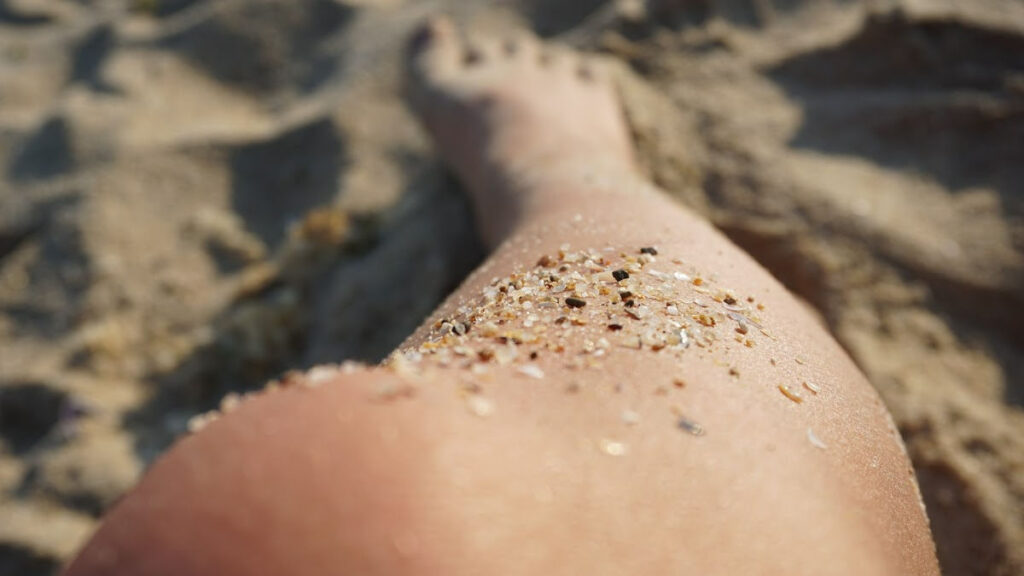For many people, a trip to the beach is a chance to relax, unwind, and enjoy the soothing effects of the ocean.
However, those with eczema may find that their skin becomes worse after a beach visit. I know mine certainly does if I don’t immediately wash my skin with fresh water after I’ve been in saltwater!
In this blog post, we’ll explore the reasons behind this phenomenon and provide helpful tips to soothe your skin if you experience an eczema flare-up after a beach trip.
Why Does Eczema Worsen at the Beach?
1. Sun Exposure
Spending time under the sun’s rays can be a trigger for eczema flare-ups in some individuals. The sun’s ultraviolet (UV) rays can lead to dryness, redness, and irritation of the skin, making eczema symptoms more pronounced.
2. Saltwater
While saltwater is often touted for its potential benefits for eczema, it can also have a drying effect on the skin. The high salt content in seawater can strip the skin of its natural oils, leading to increased dryness and irritation. Moreover, if you have open wounds or cracks due to eczema, the saltwater can cause stinging and further discomfort.
3. Sand and Irritants
The texture of sand can act as an irritant for individuals with eczema. The abrasive nature of sand can cause micro-tears in the skin, leading to increased inflammation and worsening of eczema symptoms. Additionally, the beach environment may contain other irritants like pollen, algae, or seaweed, which can trigger eczema flare-ups in sensitive individuals.
4. Sweating and Heat
The combination of heat and humidity at the beach can make eczema worse for some individuals. Sweating can lead to increased itching and irritation, while high humidity levels can prevent proper evaporation of sweat, trapping moisture on the skin and potentially exacerbating eczema symptoms.
Tips to Soothe Your Skin After a Beach Trip
1. Rinse Thoroughly
After swimming in saltwater, it is essential to rinse off the salt and sand from your skin. Use lukewarm water to gently cleanse your skin, ensuring all residue is removed. Pat your skin dry with a soft towel instead of rubbing, which can cause further irritation.
2. Moisturize Liberally
Moisturizing your skin is crucial to replenish lost moisture and create a protective barrier. Choose a thick, fragrance-free moisturizer and apply it generously to damp skin within a few minutes of rinsing. Pay extra attention to areas prone to dryness and eczema flare-ups.
3. Use Cold Compresses
If your skin feels hot and inflamed, applying cold compresses can provide soothing relief. Wrap an ice pack or a clean cloth soaked in cold water around the affected areas for a few minutes at a time. Be sure to place a barrier, like a thin towel, between the compress and your skin to avoid direct contact.
4. Avoid Scratching
Itchy skin can be incredibly tempting to scratch, but it only worsens eczema symptoms. Trim your nails short and consider wearing lightweight cotton gloves or using distractions like fidget toys to prevent scratching. If necessary, consult your doctor about over-the-counter or prescription antihistamines to help alleviate itching.
5. Hydrate from Within
Drinking plenty of water can help keep your skin hydrated from the inside out. Stay well-hydrated during and after your beach trip to support your skin’s natural moisture balance.
6. Continue your Skincare Routine
Stick to your regular skincare routine, including using gentle cleansers and moisturizers formulated for sensitive skin. Avoid harsh soaps, fragrances, and other potential irritants that may aggravate your eczema.
7. Seek Medical Advice if Needed
If your eczema flare-up persists or worsens despite these self-care measures, it’s important to consult a dermatologist or healthcare professional. They can provide personalized guidance, recommend specific treatments, or adjust your existing eczema management plan.
Pay attention to your triggers
While a trip to the beach can be enjoyable, individuals with eczema need to take extra care to prevent worsening of their symptoms.
Understanding the potential triggers, such as sun exposure, saltwater, sand, and sweating, can help you prepare and take necessary precautions. By following the tips mentioned above, you can soothe your skin and minimize the impact of a beach trip on your eczema.
Remember, everyone’s eczema is unique, and what works for one person may not work for another. It’s important to listen to your body, pay attention to triggers, and adapt your skincare routine accordingly.

